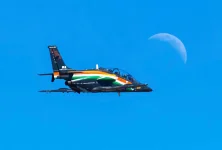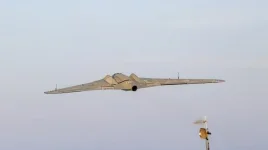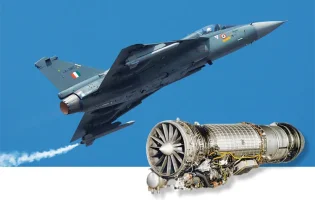- Views: 2K
- Replies: 12
India's push for self-reliance in the defence sector is poised to take a monumental leap forward, with the Ministry of Defence preparing to finalise a contract worth approximately Rs 66,000 crore with Hindustan Aeronautics Limited (HAL).
The agreement is for the procurement of 97 additional Light Combat Aircraft (LCA) Tejas Mk-1A jets for the Indian Air Force (IAF).
According to HAL's Chairman and Managing Director, DK Sunil, the landmark deal is anticipated to be officially signed in October 2025, marking one of the largest-ever contracts for domestically produced military hardware.
The LCA Tejas Mk-1A is a significantly upgraded version of the indigenous Tejas fighter, designed to form the backbone of the IAF's modern combat fleet.
This advanced variant incorporates more than 40 improvements over the initial Tejas Mk-1 version. Key upgrades include an Active Electronically Scanned Array (AESA) radar for superior target detection, an advanced electronic warfare suite for enhanced survivability, and the capability to fire a variety of beyond-visual-range missiles.
This order is crucial for the IAF's modernisation plan, aimed at replacing its fleet of ageing MiG-21s and arresting the decline in its number of fighter squadrons.
The finalisation of this new contract is strategically timed and depends on HAL meeting a key milestone from a previous agreement.
The new deal will proceed shortly after HAL delivers the first two aircraft from an earlier order for 83 LCA Mk-1A jets, a contract valued at Rs 48,000 crore that was signed in February 2021. DK Sunil confirmed that the necessary paperwork is being prepared.
Following the signing, HAL will also formalise a critical sub-contract worth nearly $1 billion with US-based GE Aerospace for 113 F404-IN20 engines, which will power the new fleet of Tejas fighters.
This massive order will solidify HAL's position as a premier aerospace manufacturer and is a testament to its expanding production capabilities.
The state-owned enterprise has been systematically increasing its production capacity to meet the IAF's urgent requirements.
It plans to ramp up its annual production rate from the current 8 aircraft to 16, with a target of eventually reaching 24 aircraft per year.
This scaling-up effort is vital to ensure timely delivery and the swift operationalisation of new squadrons within the Air Force.
The Rs 66,000-crore deal represents a defining moment for India’s 'Aatmanirbhar Bharat' initiative.
By investing heavily in a home-grown fighter platform, the government is reinforcing its commitment to reducing dependency on foreign military imports.
This contract will not only equip the IAF with a potent, modern fighter jet but will also stimulate the domestic defence ecosystem, foster technological innovation, create thousands of skilled jobs, and enhance India's potential as a future exporter of advanced military aircraft.



